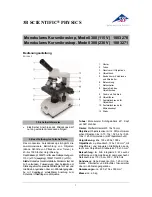
9
4. KNOWING YOUR MICROSCOPE
4.1 Stereo Body with Binocular or Trinocular Head
For the SMZ-171 stereomicroscopes, the binocular or trinocular tubes are built into the stereo body to
form a single unit called a
“Stereo-head”
. The SMZ-171 BL (Fig.1) is equipped with a binocular tube
while the SMZ-171 TL (Fig.2) is equipped with a trinocular tube.
4.1.1 Stereo
Body
●
The Stereo body is the key component of the microscope. It includes the Greenough stereo-zoom
system with a continuous zoom range of 6.7:1. It also includes separate left and right non-telescopic
optics
systems.
●
With this system, users are able to enjoy excellent depth of field and stereo effects. With the help of
precision optics from
Motic
, perfect parfocality is maintained throughout the entire zoom range.
●
The zoom knobs are located on both sides of the microscope and scales are printed on the knobs to
display the current magnification. Adjust these knobs to change the magnification of the image. If the
microscope has been properly adjusted, the image should remain in focus even when the
magnification is changed (parfocal). For adjustment procedures, refer to section
3.2
of this manual.
●
The stereo body is mounted onto the circular mount of the head holder and is locked into place
using the locking screw on the right hand side of the holder. While operating the microscope, this
locking screw should always be locked to maintain utmost stability.
4.1.2 Binocular tube for the SMZ-171B
●
The interpupillary distance can be adjusted by moving horizontally the two eyepiece tubes. For
proper interpupillary distance adjustment (Fig.6), refer to section
3.1
of this manual.
●
The eyepiece can be secured in the eyepiece tube using a small screw. This is important for easy
adjustment of the eyepiece diopter.
●
N-WF eyepiece, high eye-point 10X (Ø23), diopter adjustable, interchangeable with biological
Eyepieces.
(Fig.6)
Summary of Contents for SMZ-171 BL
Page 1: ......
Page 5: ...4 1 1 Nomenclature SMZ 171 BL Fig 1 SMZ 171 TL with ESD Fig 2...
Page 20: ...19...
Page 22: ......








































